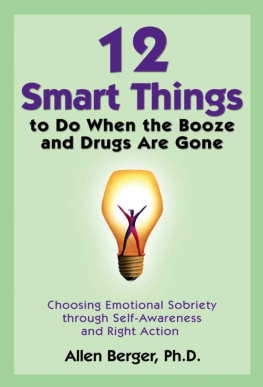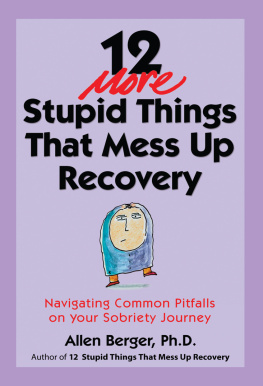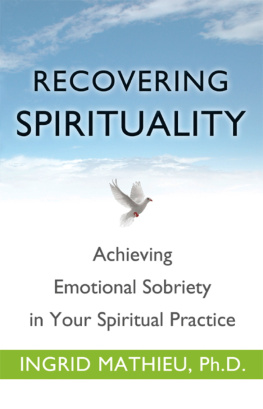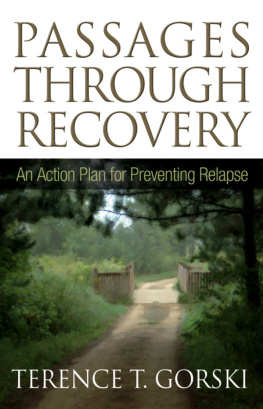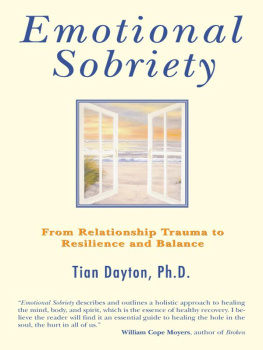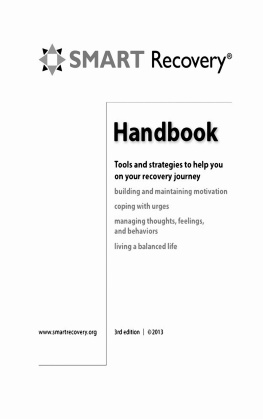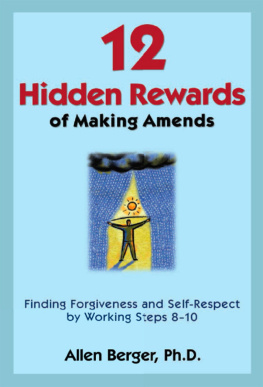12 Smart Things to Do When
the Booze and Drugs Are Gone
Smart Things
to Do When the Booze
and Drugs Are Gone
Choosing Emotional Sobriety through
Self-Awareness and Right Action

ALLEN BERGER, PH.D.

Hazelden Publishing
Center City, Minnesota 55012
800-328-9000
hazelden.org/bookstore
2010 by Allen Berger
All rights reserved. Published 2010
Printed in the United States of America
The Emotional Sobriety Inventory Form on page 173 may be reproduced for personal or group use. Otherwise, no part of this publication may be reproduced, stored in a retrieval system, or transmitted in any form or by any meanselectronic, mechanical, photocopying, recording, scanning, or otherwisewithout the express written permission of the publisher. Failure to comply with these terms may expose you to legal action and damages for copyright infringement.
Library of Congress Cataloging-in-Publication Data
Berger, Allen, 1952
12 smart things to do when the booze and drugs are gone : choosing emotional sobriety through self-awareness and right action / Allen Berger.
p.cm.
Includes bibliographical references.
ISBN 978-1-59285-821-7 (softcover)
Ebook ISBN 978-1-59285-995-5
1. AddictsRehabilitation.2. Emotional maturity.3. Self-help techniques.I. Title.
II. Title: Twelve smart things to do when the booze and drugs are gone.
HV4998.B46 2010
616.8603dc22
2010020762
Editors note
The names, details, and circumstances have been changed to protect the privacy of those mentioned in this publication.
This publication is not intended as a substitute for the advice of health care professionals.
Alcoholics Anonymous, AA, the Big Book, the Grapevine,AA Grapevine, and GV are registered trademarks of Alcoholics Anonymous World Services, Inc.
Permission to reprint The AA Grapevine, Inc., copyrighted material in this publication does not in any way imply affiliation with or endorsement by either Alcoholics Anonymous or The AA Grapevine, Inc.
14 13 12 11 101 2 3 4 5 6
Cover design by David Spohn
Composition by BookMobile Design and Publishing Services
Dedication
I dedicate this book to Tom Sawdei, a kind and gentle friend with a very bright future, who valiantly struggled to see beyond his addiction and societys stigma to the endless possibilities of recovery. I miss you, Tom.
Contents
Foreword
Emotional sobriety has not been given its due recognition in recovery. We have understandably focused all of our energy on the early stages of recovery, but unfortunately we have not sufficiently addressed the many challenges that occur after we put the plug in the jug. It is my opinion that one of the major causes of relapse is our failure to grow up and address our emotional dependency.
Once in a while, a writer comes along who extends and completes an earlier discovery made about recovery. This is the unique accomplishment of the work of Dr. Allen Berger in explaining the role of emotional maturity in recovery. Dr. Berger expands on Bill Wilsons understanding of emotional sobriety. He bases his work on Bill Wilsons concepts, outlined in his 1958 AA Grapevine article titled The Next Frontier: Emotional Sobriety.
The power of Dr. Bergers book is in his attention to detail. Each chapter is carefully constructed with clear explanations. He provides us with a tool to make a fearless and thorough emotional inventory. He integrates concepts from many different sources in psychology, and he provides us with exceptional case studies that illustrate the working points of the text.
The tasks and instructions set forth in this book provide an excellent guide to emotional sobriety. Dr. Berger defines the problem in easily understood terms as our emotional dependency or our failure to grow up. He explains how our idealized self and false self create obstacles to our maturation. He then points out the solution as differentiation of the self, and as recovering our lost, true self. He gives us a way of moving beyond emotional dependency in our relationships to a place of autonomy and choice. In a sense, the solution for those who lack emotional sobriety sounds simple: grow up. But of course, if emotional sobriety were that simple, we would all have achieved it long ago. True emotional sobriety is a lifes journey, with twists and turns, delays and detours, and much to be learned along the way. Dr. Berger provides a wonderful, detailed road map to guide readers on the journey.
Jerry McDonald, ACATA
Producer, Drug Awareness Hour at the Betty Ford Center
Acknowledgments
Sid Farrar, Hazeldens Editorial and Trade Director, played a crucial role in this book. Sid helped me discover that it was this book that I needed to write next. Sid, I deeply respect your professionalism, insights, honesty, and integrity.
I am also grateful to Sid for assigning Vincent Hyman to this project. Vince was a perfect fit for me. I developed a wonderful collaborative relationship with him. Vince, you were a godsend and helped me tremendously at every stage of this project. The quality and depth of this book are a direct result of your efforts. You served in so many different roles during this process: You were my muse, my critic, my friend, my colleague, and an outstanding editor. Thank you.
I also want to acknowledge the Hazelden marketing staff, especially Lisa Malani and Alison Vandenberg, for their ongoing support and their faith in my work. Our professional relationship means a lot to me.
Tom McCall, my sponsor, plays a crucial role in whatever I do personally and professionally. Tom, for over thirty-eight years, you have been my counsel, my friend, my inspiration, and a safe haven. In fact, in the first year of my recovery, you turned me on to the Grapevine article that eventually became the inspiration for this book. Thank you, my friend. I will be forever grateful for your love, your support, your wisdom, and your guidance.
And finally I want to acknowledge Southwest Airlines and its wonderful employees. You made my travels safe, comfortable, and enjoyable. Thank you! This entire book was written on Southwest flights between Nashville and Los Angeles.
Introduction
Understanding Emotional Sobriety
This book will help you take the next step in your recovery. It is about the emotional quality of your recovery. It will help you grow up and teach you how to better cope with your emotions. It is about emotional sobriety.
The concept of emotional sobriety is not easy to grasp. Lets start with an example.
I want you to meet John. He has been clean and sober for ten years. In the past year, he has been struggling with bouts of anxiety. For a long time he believed he was suffering from an undiagnosed medical problem that was causing his anxiety. First, he thought he was having a heart attack because of irregular heartbeats. After he received a thorough cardiac exam, including a treadmill stress test that showed his heart to be quite healthy, he next thought it might be a brain tumor. But after his MRI was normal, he finally accepted that his anxiety was psychological in nature, not physiological. His sweaty palms, headaches, stomachaches, heart palpitations, slight tremors, and feelings of dread and impending doom were all symptoms of anxiety.
Next page
